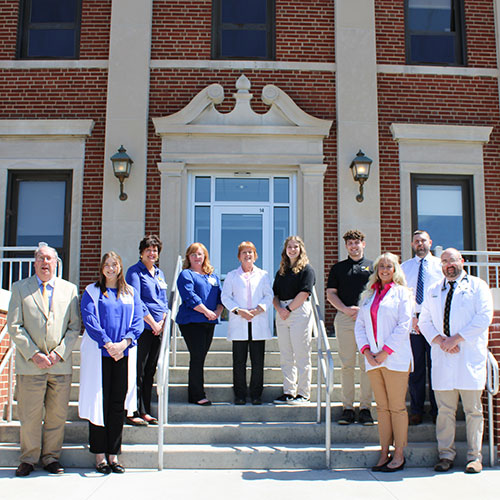
Community Care Network reaches 10-year milestone of fostering a healthier community

The College of Wooster and Wooster Community Hospital (WCH) are celebrating 10 years of a partnership that has led to a healthier community and graduates who are better-prepared health care professionals.
The collaboration, known as the Community Care Network (CCN), has made a significant difference in the Wooster community, said WCH’s Angel Leighty, RN, BSN, CCN clinical manager. Since the program began in 2013, about 525 patients have benefited from an average of 350 monthly home visits by an interdisciplinary team of health professionals and nearly 350 Wooster student health coaches. That equates to approximately 42,000 home visits throughout the program’s 10-year history.
CCN assists primary care physicians in managing high-risk patients by using student health coaches to visit patients in their homes and provide the “added assistance, the added eyes and ears” for their patients’ wellbeing, Leighty said.
The goals of the program for the hospital are to promote wellness, reduce the need for potentially unnecessary procedures and hospitalizations, and promote the delivery of evidenced-based care for patients who might otherwise overuse hospital resources.
Throughout the first decade of service, CCN has provided a trifecta of results. Wooster area patients feel better and have improved health. Primary care physicians have help managing high-risk patients in the community, and Wooster students gain valuable experience caring for patients, often before they pursue professional health care careers.
Wooster Community Hospital President and CEO Bill Sheron started the program after he attended a health care conference and heard about a health coach program in Pennsylvania. “It was small, with eight to 10 students, but it made a lot of sense. I thought, ‘We could do this in Wooster and do it bigger and better,’” Sheron said. He returned to Wooster and talked with The College of Wooster administrators, and “They graciously got on board immediately.” Today, as the largest and longest-running program of its kind in the nation, CCN has become a model program.
Michelle McConnell, physician’s assistant with the Wooster Heart Group, likes to share a patient story that epitomizes the impact of CCN. A non-compliant patient, known for not taking care of himself, was frequently hospitalized for congestive heart failure. Once the CCN got involved, his health story turned around. Regular home visits by his health coach led to a better understanding of some of his health issues. They discovered he couldn’t see because of cataracts. After cataract surgery improved his sight, he started to be more compliant with his diabetes care and took better care of himself. Eventually, he was able to get out, see family again, and enjoy life. “It was a great success story,” McConnell said.
“The data is very clear that the more we can have people be reminded of the things they are supposed to do—take their medications, use their oxygen, stop smoking—the more successful we are at getting compliance,” said Dr. Bruce Arthur, a pulmonary critical care specialist at WCH. “From a patient’s standpoint, it’s much more personal and long-lasting because they have a lot more interaction with the students than I have the ability to do out of my office.”
Wooster resident Bob Jeffery enrolled as a CCN patient about two-and-a-half years ago. His health coach assists him with his medications, takes his vitals, and spends time talking to him about everything from medical topics to sports. “I’m very thankful she helps me with my medicine, encourages me to drink plenty of liquids, and be mobile as much as possible,” Jeffery said. His mobility has increased, and he consistently remembers to take his medicines and eat his meals.
CCN provides a chance for patients who may not qualify for home visits through Medicare or other insurance programs. The free service offers patients a medical component, and more importantly, a social aspect. “It’s a wonderful program to put a youth in the home to bring a lot of connectiveness. It’s just a really good program for people who need that extra layer of care,” said Dr. Amy Jolliff, family physician at Milltown Family Physicians and CCN co-director.
“We have seen better quality of life because of having somebody in the home. We see patients able to make changes that they never would have been able to make without someone there every week to give them support and positive feedback,” she said.
“The most exciting portion of this program that I get to be involved with is seeing the impact these students have with the patients,” Leighty said. “We have so many patients in our community who don’t have any support. It’s a reward to the patients as well as the students to get attention and get the help that they need to stabilize their health.”
On average, about 60 health coaches are in the field each year, and about 86% of the students who have been involved in the program have served multiple semesters as health coaches, said Jenni Griffin, dean of Advising, Planning, and Experiential Learning (APEX) at the College. Marian Frazier, professor of statistical & data science, and former Wooster student Brian Karavantas ’16 assessed the student outcomes for health coaches. “Their research suggests that students who participated in the program felt that being a health coach provided good preparation for careers and were encouraged to continue their education post-Wooster,” Griffin said.
Wooster health coach Lily Anderson ’23, a biochemistry and molecular biology major from Greenville, South Carolina, has been a health coach for three years. When she visits her patients, she checks their blood pressure, blood sugar, weight, and medicine boxes, and makes sure they are properly taking their medications. She listens to stories about the history of Wooster, and gladly tells them funny stories about what is going on in her life. “I talk to them and get medical and non-medical updates on their life, because they are more than just patients. They are people too,” Anderson said.
“Being a part of the program has really added an extra dimension to my education at Wooster. Beyond the traditional classroom, beyond the lectures, exams, and labs, CCN gets me out in the community where I can actively do something to benefit people around me. I can also see some of the information I learn in classrooms applied in real-world situations,” said Anderson, who plans to attend medical school after a year of AmeriCorps service in Cleveland schools.
Tudor Lungu ’24, a neuroscience, neurobiology, pre-med student, originally from Romania, plans to study to become a surgeon. He lived in Maryland for three years before coming to Wooster and was able to shadow doctors at the renowned Johns Hopkins. “I knew about the health coach program before I got on campus. It was one of the main reasons I came to Wooster. They put the emphasis on doing this program and being able to talk to and interact with patients,” he said.
“One of the main things I’ve realized is that you need to make sure to listen to the patients. If you listen to them, they’ll be able to give more insight into what’s going on with them,” Lungu said. That information is shared with the nurses and doctors to adapt the patient’s health care plans.
The study done by Frazier and Karavantas found a common thread from former health coaches. “The hard skills they learned were useful but the soft skills they learned were more important and harder to teach,” Frazier said. One respondent recalled finding her patient on the ground having suffered a stroke minutes before arriving. They called the emergency squad and had the patient’s medication list ready. “Knowing that I can trust myself in those situations has given me some confidence that I know a lot of my peers [in Med School] don’t have because they haven’t gone through that yet,” the student health coach reflected.
The physicians and other health care providers involved in the program agreed that Wooster College students receive many benefits from being health coaches. The program teaches language, evaluation, presentation, and documentation skills as well as fundamental health care techniques that can be important for any health care provider, not exclusively physicians. “We are trying to prepare people to be the best health care providers they can be whatever field they choose to go into,” said Jolliff.
Some of the health coach graduates indicated the program had not changed their plans to become medical professionals, but the experience changed what kind of doctor they wanted to be, Frazier added.
A survey respondent offered this for future potential health coaches: “At the heart of the program is the people skills and the interaction. Making a connection with your patient is the number one priority, especially if they are in a vulnerable spot because they aren’t going to listen to any of your advice until they trust you and have a connection with you. You are part of their care team and hopefully you’re going to play an influential part in these people’s lives, and that means something to them.”
Posted in News on April 25, 2023.


